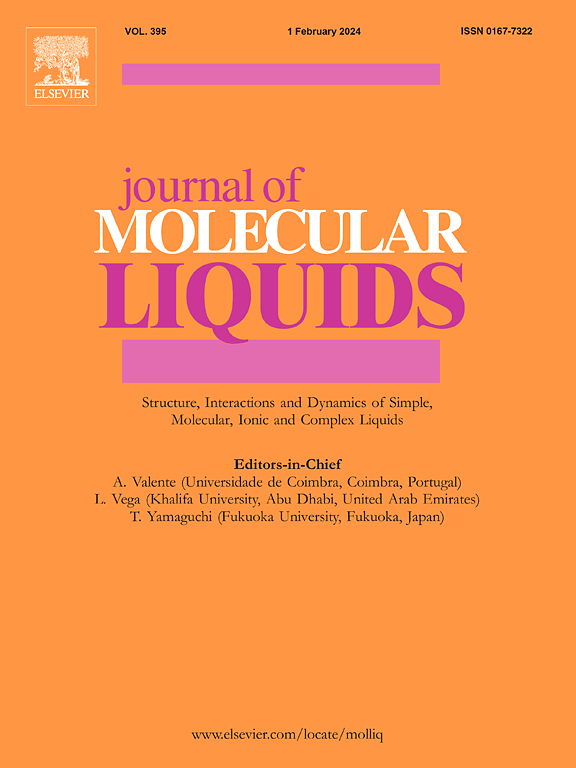Effect of the advancing contact angle on coal particle–bubble detachment at the mesoscopic scale
IF 5.3
2区 化学
Q2 CHEMISTRY, PHYSICAL
引用次数: 0
Abstract
Improving particle–bubble adhesion stability and reducing particle–bubble detachment are crucial in froth flotation processes. In this study, a nonequilibrium molecular dynamics approach is applied to investigate the dynamic detachment process of low-rank coal particles adhering with/without a collector from bubbles under different pull forces at the mesoscopic scale. Results indicate that a collector oil film on the surface of a low-rank coal particle can considerably increase the advancing contact angle and counteract the contraction of the three-phase contact line, enabling the particle to withstand a greater detachment force. Conversely, the residual water clusters on the particle surface tend to cause contraction of the contact line. Force analysis of the liquid surrounding the particle and the contact line indicates that the maximum static capillary force between the particle and the bubble is equivalent to the capillary force when the bending angle of the liquid surface reaches the advancing contact angle. When the bending angle of the liquid surface exceeds the forward contact angle, the force on the liquid around the contact line becomes unbalanced, causing the contact line to move to decrease the bending angle of the liquid surface and restore balance to the surrounding liquid. Hence, on mesoscopic scales of ten to tens of nanometers, the advancing contact angle still determines particle–bubble detachment. The study of particle–bubble detachment mechanisms at the mesoscopic scale is expected to establish a relation between microscopic mechanisms at the molecular scale and macroscopic experimental studies at the micrometer to millimeter scale.
推进接触角在中观尺度上对煤颗粒-气泡分离的影响
在泡沫浮选过程中,提高颗粒与气泡之间的粘附稳定性和减少颗粒与气泡之间的脱离至关重要。本研究采用非平衡分子动力学方法,在中观尺度上研究了有/无捕集剂的低阶煤颗粒在不同拉力作用下与气泡的动态分离过程。结果表明,低阶煤颗粒表面的集流体油膜能显著增大前进接触角,抵消三相接触线的收缩,使颗粒能承受更大的脱离力。相反,颗粒表面残留的水团则会导致接触线收缩。对颗粒和接触线周围液体的受力分析表明,当液体表面的弯曲角达到推进接触角时,颗粒和气泡之间的最大静态毛细管力相当于毛细管力。当液体表面的弯曲角超过前进接触角时,接触线周围液体所受的力会变得不平衡,从而导致接触线移动,以减小液体表面的弯曲角,恢复周围液体的平衡。因此,在十几纳米到几十纳米的介观尺度上,前进接触角仍然决定着粒子-气泡脱离。在介观尺度上研究粒子-气泡脱离机制,有望在分子尺度的微观机制与微米至毫米尺度的宏观实验研究之间建立联系。
本文章由计算机程序翻译,如有差异,请以英文原文为准。
求助全文
约1分钟内获得全文
求助全文
来源期刊

Journal of Molecular Liquids
化学-物理:原子、分子和化学物理
CiteScore
10.30
自引率
16.70%
发文量
2597
审稿时长
78 days
期刊介绍:
The journal includes papers in the following areas:
– Simple organic liquids and mixtures
– Ionic liquids
– Surfactant solutions (including micelles and vesicles) and liquid interfaces
– Colloidal solutions and nanoparticles
– Thermotropic and lyotropic liquid crystals
– Ferrofluids
– Water, aqueous solutions and other hydrogen-bonded liquids
– Lubricants, polymer solutions and melts
– Molten metals and salts
– Phase transitions and critical phenomena in liquids and confined fluids
– Self assembly in complex liquids.– Biomolecules in solution
The emphasis is on the molecular (or microscopic) understanding of particular liquids or liquid systems, especially concerning structure, dynamics and intermolecular forces. The experimental techniques used may include:
– Conventional spectroscopy (mid-IR and far-IR, Raman, NMR, etc.)
– Non-linear optics and time resolved spectroscopy (psec, fsec, asec, ISRS, etc.)
– Light scattering (Rayleigh, Brillouin, PCS, etc.)
– Dielectric relaxation
– X-ray and neutron scattering and diffraction.
Experimental studies, computer simulations (MD or MC) and analytical theory will be considered for publication; papers just reporting experimental results that do not contribute to the understanding of the fundamentals of molecular and ionic liquids will not be accepted. Only papers of a non-routine nature and advancing the field will be considered for publication.
 求助内容:
求助内容: 应助结果提醒方式:
应助结果提醒方式:


